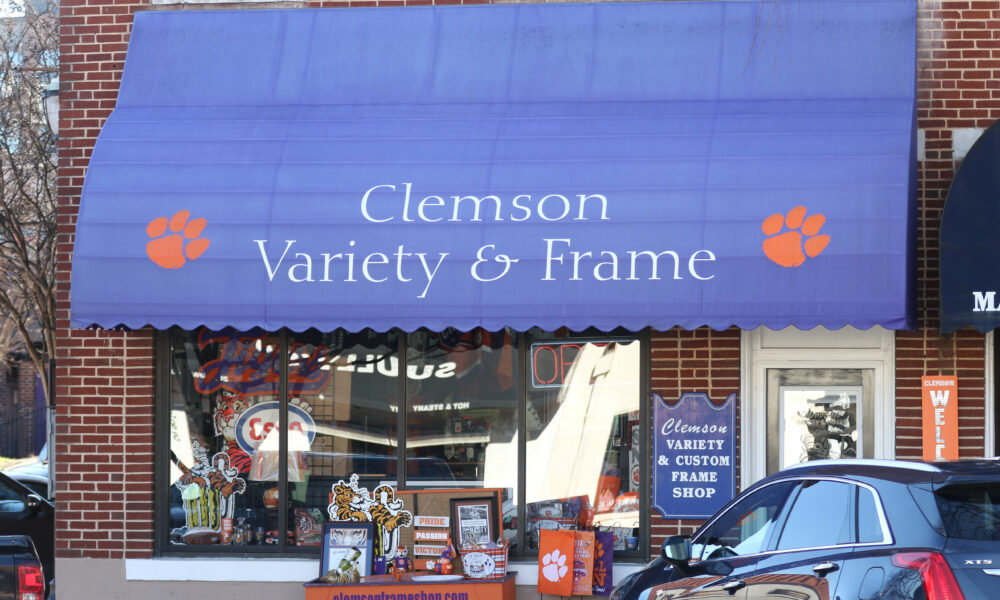Samantha Kriney gets it. Unfortunately, Clemson University does not.
Clemson announced in February that the 2021 Commencement Ceremonies will be held May 5-8 at the Bon Secours Wellness Arena in Greenville, S.C.
It will mark the third time since the pandemic hit last March that Clemson will hold its graduation ceremonies 45 minutes from Clemson. A decision that has downtown business owners in Clemson mad and students asking why?
“The local economy here is really struggling,” said Kriney, a senior finance major from Hilton Head, S.C. “So, everything in Greenville right now is booked up. All the restaurants are booked up. All the hotels are booked up. What about Clemson?
“What about our hotels? What about are restaurants? It just worries me for such a small local economy.”
The business owners are worried too.
Eight local business have already closed their doors for good as a result of last year’s shutdown and the lack of foot traffic coming through Clemson since the athletic department was unable to host 80 percent of its full capacity at Memorial Stadium, Littlejohn Coliseum and Doug Kingsmore Stadium.
With graduation once again being held in Greenville, the shops in downtown Clemson will take about a 70-percent hit to their summer business. This is money many of them depend on to help with expenses during the summer months, when foot traffic in Clemson is at its lowest of the year.
“Whether it be parents, businesses, city government or even the graduating seniors, nobody understands why it can’t be in Clemson,” said Jason Beaty, who owns the Clemson Varity & Frame shop in Clemson. “There are other things they have found a way to make happen, but this one they just seem to … and I’m not disparaging anybody (at Clemson) for making a difficult decision.
“What we, the downtown businesses, are asking them to do is to look at it again and to please try and find a way.”
If Clemson does decide to keep its graduation ceremony in Greenville, the city of Clemson and its businesses stand to lose millions of dollars.
Last year, the pandemic cost the city alone in just accommodation tax (bed tax on hotels) and hospitality tax (food and beverage) nearly $2.6 million in the month of May.
Beaty is concerned more businesses like his will go out of business if the city does not get the opportunity to recoup some of that money this year with the smaller graduating crowds.
“And it is not just Clemson. You have Seneca and Pendleton that are probably taking a hit on this,” he said. “Because when hotel rooms in Clemson get filled up, people start spilling into the Pendleton and Seneca area.
“So, the Clemson piece is just one piece, granted it is the biggest piece, but to look at the totality of it, this is kinda our last opportunity to make money before the dog days of summer. In a typical year, May graduation gets me through June and July. It provides the money for inventory, to buy for football season and it also pays the bills for June and July when there are not many people coming downtown.”
The sad part of it, as Beaty and Kriney pointed out, Greenville is getting all of their business.
“They are not coming back to Clemson after graduation is over,” Beaty said. “They are not coming here to shop. They don’t want to drive all the way back over here. They are shopping in Greenville. They are eating in Greenville restaurants and they are staying in Greenville hotels.”
With the vaccine being distributed, the governor lifting some of the restrictions and Clemson University announcing they are going to be on a more normal schedule, Beaty said the downtown businesses got their hopes up.
“We were like, ‘Cool! They are starting to normalize a little bit,’” said Beaty, who said he and the other business leaders first learned about Clemson’s decision on graduation last week. “Then they come out in early February and make an announcement for May when everybody was hoping and expecting, with the vaccination situation, come the first week of May the situation is going to be a whole better than it is now.”
